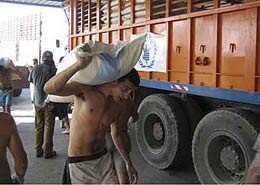World Food Programme 1 August 2006

(Photo: UN/Omar Aboud)
Out of three convoys planned for today to the southern villages of Tebnin, Rmeish and Naqoura, WFP only received concurrence from the Israeli Defence Forces to proceed to Tebnin.
Out of the 18 trucks of food and other supplies organised for delivery, only six, carrying food and UNICEF items, will reach the people of Tebnin.
The first time WFP did not get concurrence for a convoy was on Sunday, 30 July, to the Lebanese town of Marjayoun.
No time to waste
“We are increasingly frustrated that our convoy movements are being hampered, leaving people in the south stranded for what is now nearly three weeks. We have no time to waste - they are running out of food, water and medicine. Many are poor, sick, or elderly and could not be evacuated earlier,” warned Amer Daoudi, WFP Emergency Coordinator.
According to one humanitarian organisation working in Lebanon, a food crisis is looming in the south, where a severe shortage of water is prompting people to drink from animal ponds that are contaminated with bacteria.
Rmeish, which usually has 5,000 residents, is now hosting 25,000 inhabitants who have fled the fighting in surrounding areas.
Convoys blocked
“We ask all parties to this conflict to allow these convoys to move, otherwise we are going to see even more tragedy and more suffering than we’ve seen so far,” Daoudi added.
WFP’s convoy to Qana yesterday, carrying enough food to feed 6,500 people for 15 days, was obliged to move at a crawl due to traffic jams as thousands of people took advantage of the lull in shelling to flee to the north.
Destroyed roads and bridges are also forcing the convoys onto secondary roads, where progress is painfully slow.
As coordinator of the massive logistics operation bringing humanitarian relief to Lebanon, WFP is also increasingly concerned over the fuel availability for the UN truck convoys.
Drastic fuel shortages
Drastic shortages have meant that private cars are left abandoned as filling stations close; 60-80 car queues are common for those few remaining open.
“We desperately need commercial fuel tankers to be allowed to dock in Beirut and Tripoli,” said Daoudi, noting that the operation of power stations and other key installations are under severe threat.
With its responsibility to transport all aid for UN agencies and much of the humanitarian community throughout Lebanon, WFP is planning to send at least two convoys a day to the south, which has borne the brunt of the hostilities between Israeli and Hizbollah fighters.
Land crossing
Since the conflict began nearly three weeks ago, the UN estimates that more than one million people have been displaced by the conflict — 800,000 people in Lebanon - one-fifth of the entire population - and up to 300,000 on the Israeli side.
On Saturday, WFP established the first international land crossing for regular humanitarian shipments into Lebanon from Syria with a convoy carrying UNICEF and UNHCR relief items.
A second convoy of relief aid from Arida to Beirut is scheduled for today.
The border point at the Mediterranean town of Arida, is the only crossing remaining open to traffic between the two countries.
Waves of refugees
Over the past few days, tens of thousands of refugees have been flooding over the border to escape the fighting.
In Syria, WFP has begun distributing baked bread to nearly 7,000 Lebanese people who have taken shelter in public buildings in Damascus.
With the number of refugees expected to increase, WFP has contingency plans to feed some 20,000 people in the Syrian capital.
Flash appeal
WFP operations within the UN flash appeal have been budgeted at a total of US$48 million, including logistical support and an emergency operation to provide food aid, valued at US$8.9 million, to respond to the immediate food needs of displaced Lebanese.
WFP is prioritising assistance to 95,000 displaced people seeking shelter in schools and public institutions in Beirut, 165,000 people in the heaviest-hit areas in southern Lebanon and 50,000 of the approximately 140,000 people in Syria who have fled the conflict.
Related Links